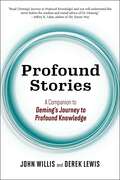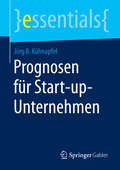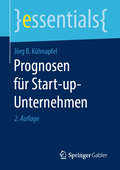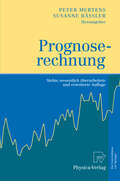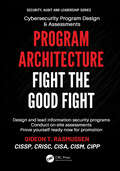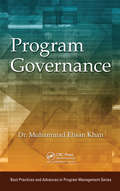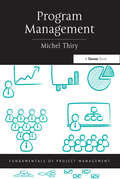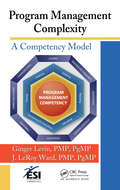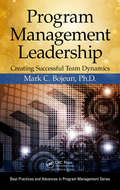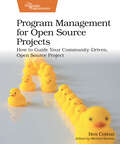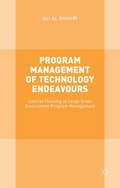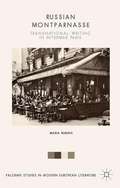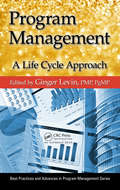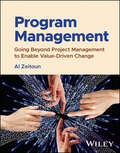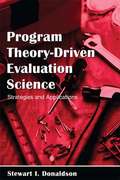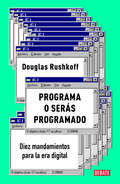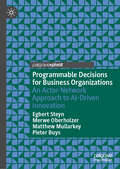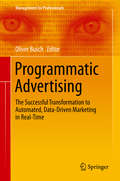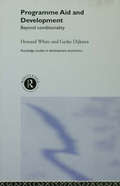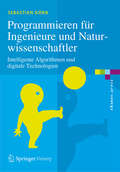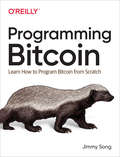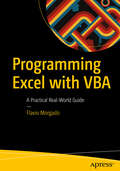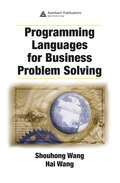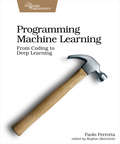- Table View
- List View
Profound Stories: A Companion to Deming's Journey to Profound Knowledge (Deming's Journey to Profound Knowledge)
by Derek Lewis John WillisIn this captivating companion to Deming's Journey to Profound Knowledge, authors John Willis and Derek Lewis share the untold stories and fascinating details that didn't make it into the original book. Profound Stories takes readers on a deeper dive into the life and times of W. Edwards Deming, offering rare insights and anecdotes that further illuminate the legendary figure's journey to developing his influential System of Profound Knowledge.From Deming's humble origins to his wartime efforts and his pivotal role in Japan's post-war economic miracle, Willis and Lewis leave no stone unturned. Readers will discover the intriguing history behind key concepts like the PDSA Cycle and the Red Bead Game, as well as Deming's connections to other notable figures like Claude Shannon and Vannevar Bush.Profound Stories and Deming's Journey to Profound Knowledge explores the far-reaching impact of Deming's ideas, from the US Census to the American automotive industry to NASA's Apollo program. Willis and Lewis masterfully weave together historical context and personal accounts, creating a rich tapestry that brings Deming's story to life in vivid detail.Whether you're a devoted Deming follower or simply curious about the man behind the philosophy, this engaging and enlightening collection of stories offers a fresh perspective on Deming's life and legacy, revealing the profound impact of his ideas on the world we live in today.
Prognose von Wohnungseinbrüchen mit Hilfe von Machine-Learning-Algorithmen (BestMasters)
by Daniel HaakeDas Buch beschäftigt sich mit der Möglichkeit der Prognose von Wohnungseinbrüchen mit Hilfe von Machine-Learning-Verfahren. Die Analyse beschränkt sich auf die Fragestellung, ob nach einem erfolgten Wohnungseinbruch mit einer Nachfolgetat, den sog. Near-Repeats, zu rechnen ist. Dabei wird untersucht, welche Faktoren zu guten Prognoseergebnissen beitragen. Zur Verfügung stehen Daten zu Wohnungseinbrüchen aus Baden-Württemberg aus den Jahren 2010 bis 2017. Ergänzt werden die polizeilichen Daten um geografische Daten, die den Tatort beschreiben. Hiermit wird geprüft, ob kriminalgeografische Faktoren gute Indikatoren zur Prognose von Wohnungseinbrüchen, genauer gesagt Near-Repeats, darstellen. Als Machine-Learning-Verfahren kommen die Verfahren Random Forest, XGBoost, Support Vector Machines, Neuronale Netze und ein Soft-Voting der Modelle zum Einsatz. Mit Hilfe dieser Verfahren kann eine Präzision der Prognosen von über 60% erreicht werden. Es wird außerdem erstmalig gezeigt, dass auch Prognosen für den ländlichen Raum möglich sind.
Prognosen für Start-up-Unternehmen (essentials)
by Jörg B. KühnapfelJörg B. Kühnapfel entwickelt in diesem Essential eine Methodik, die eine verlässlichere Prognose des erwarteten Geschäftsverlaufs von Start-up-Unternehmen erlaubt. Der Autor vermittelt ein grundlegendes Verständnis für die besonderen Probleme, die bei der Erstellung von Prognosen für Start-up-Unternehmen auftreten, und beschreibt Regeln für den Umgang mit Prognosen sowie ihren Nutzen und ihre Grenzen. Innovative und praxisorientierte Prognosemethoden für unterschiedliche Start-up-Situationen werden ausführlich beschrieben, ein Fallbeispiel verdeutlicht die dargestellten Aspekte und Methoden.
Prognosen für Start-up-Unternehmen (essentials)
by Jörg B. KühnapfelJörg B. Kühnapfel entwickelt in der 2. Auflage dieses Buches eine Methodik, die eine verlässlichere Prognose des erwarteten Geschäftsverlaufs von Start-up-Unternehmen erlaubt. Der Autor vermittelt ein grundlegendes Verständnis für die besonderen Herausforderungen, die bei der Erstellung von Prognosen für Start-up-Unternehmen auftreten. Er beschreibt Regeln für den Umgang mit Prognosen sowie ihren Nutzen und ihre Grenzen. Prognosemethoden für unterschiedliche Start-up-Situationen werden pragmatisch beschrieben, ein Fallbeispiel verdeutlicht die dargestellten Aspekte und Methoden.
Prognoserechnung
by Peter Mertens Susanne RässlerMit diesem Buch liegen kompakte Beschreibungen von Prognoseverfahren vor, die vor allem in Systemen der betrieblichen Informationsverarbeitung eingesetzt werden. Praktiker mit langjähriger Prognoseerfahrung zeigen außerdem, wie die einzelnen Methoden in der Unternehmung Verwendung finden und wo die Probleme beim Einsatz liegen. Das Buch wendet sich gleichermaßen an Wissenschaft und Praxis. Das Spektrum reicht von einfachen Verfahren der Vorhersage über neuere Ansätze der künstlichen Intelligenz und Zeitreihenanalyse bis hin zur Prognose von Softwarezuverlässigkeit und zur kooperativen Vorhersage in Liefernetzen. In der siebenten, wesentlich überarbeiteten und erweiterten Auflage werden neue Vergleiche von Prognosemethoden, GARCH-Modelle zur Finanzmarktprognose, "Predictive Analytics" als Variante der "Business Intelligence" und die Kombination von Vorhersagen mit Elementen der Chaostheorie berücksichtigt.
Program Architecture: Fight the Good Fight (Security, Audit and Leadership Series)
by Gideon T. RasmussenBusiness executives consider what is necessary to protect the company. It comes down to people, process and technology, organized within an information security program. Everything has its place within the program, including business processes, assets and the right blend of controls to protect them.This book describes program architecture, the discipline of designing, implementing and leading information security programs.• Prove Yourself Ready Now• Team Development and Retention• Program Maturity• Influence Support and Funding• Cyber Threat Intelligence• Third Party Risk Management • Metrics and Reporting• Insider Risk Monitoring and Response• Threat Landscape and Controls Analysis• Conduct an Assessment• Crisis Communications• Control by GovernanceThis book provides practical advice in the areas of cybersecurity and operational risk management. The goal is to provide readers with practical advice they can use upon return to work.Chapter abstracts:Chapter 1Prove yourself ready nowThis chapter provides practical advice to prove yourself 'ready now' for a cybersecurity management role. The journey begins with a view from the executive’s side of the table and how to speak in terms of risk. There is an overview of risk management, with tips for influencing risk mitigation. Focus transitions to how a communications plan can make you more effective as a leader. There is practical advice for developing presentation skills with limited stress and anxiety through a four-step approach. With that skill in-place you can communicate program statuses to executives. Professional development and C-Level presentation round out the chapter.Chapter 2Team development and retentionThis chapter provides leaders with practical advice for developing employees in their current role, with tips to help them move laterally or to pursue promotion to management. The focus shifts to management routines throughout a calendar year, including performance and development plans, communications, financial acumen, talent review and program architecture. The chapter begins to conclude with performance calibration, succession planning, promotions and retention risk.If you are an individual contributor with a goal of being promoted to leadership, there is a significant value in this chapter. There are also activities behind the scenes that you should know about in your current role.Chapter 3Program maturityInformation security professionals must focus on maturity within cybersecurity and operational risk contexts. This chapter provides guidance to improve program maturity within four levels. It starts by establishing a foundation with a control framework, laws, regulations and contractual obligations. Next are common controls, necessary and common sense from an information security perspective. Active risk management includes types of analysis, assessment and mitigation. Strong risk management is conducted by organizations that have a very low risk tolerance. This risk-prioritized approach can be used to influence funding. So that's part of the strategy, you need support and funding to mature the program over years.Chapter 4Influence support and fundingInfluencing change with business and IT executives is a learned skill. This chapter begins with five areas of focus to influence support and funding. The concept of ‘bring friends’ solicits the support of other operational risk functions. Management routines are provided as effective ways to mitigate risk, including a risk register process, a cybersecurity committee, tabletop exercises and a cybersecurity risk management framework. Three risk analysis methodologies are provided as practical advice to communicate security risk. Tips to develop financial acumen include two budget slide examples. The chapter concludes with emphasis on the need to be a change agent and to close on projects, initiatives and risk mi
Program Governance
by Muhammad Ehsan KhanAlthough program management has received much attention in recent books, program governance remains a relatively new subject. While selected books and standards touch on this important topic, few are devoted to program governance as a subject. This book fills that need.Program Governance provides a thorough understanding of governance while reviewi
Program Management (Fundamentals of Project Management)
by Michel ThiryProgram management (PgM) is fast developing as the essential link between strategy and projects and as a vehicle for organizational change. It offers the means to manage groups of projects with a common business purpose in an integrated and effective way. The Second Edition of Michel Thiry’s Program Management builds on the bestselling title first published in 2010. The heavily revised text reflects the latest program management guides and international standards and includes: a new section on agile management in programs; the author’s own program management maturity measure; a new section on change management, which is now integral to many programs. Michel has also reviewed and revised the program lifecycle to align with the more unified view of program management that has emerged since the book was first published. The result is an essential guide to program management that incorporates a robust theoretical framework, complemented by examples and advice from one of the world’s leading practitioners.
Program Management Complexity: A Competency Model (ESI International Project Management Series)
by Ginger Levin J. LeRoy WardAlthough complexity is a phenomenon that confounds and challenges program managers across industry sectors, there is little information available that identifies the set of competencies managers need to complete their program successfully and deliver the benefits desired by stakeholders. Program Management Complexity: A Competency Model fills this
Program Management Leadership: Creating Successful Team Dynamics (Best Practices in Portfolio, Program, and Project Management #9)
by Mark C. BojeunThis is not another how-to guide for program managers or another reiteration of the Project Management Institute's standards for program management. Instead, Program Management Leadership: Creating Successful Team Dynamics examines various leadership approaches and illustrates the value of effective leadership styles in Program Management for
Program Management for Open Source Projects
by Ben CottonEvery organization develops a bureaucracy, and open source projects are no exception. When your structure is intentional and serves the project, it can lead to a successful and predictable conclusion. But project management alone won't get you there. Take the next step to full program management. Become an expert at facilitating communication between teams, managing schedules and project lifecycle, coordinating a process for changes, and keeping meetings productive. Make decisions that get buy-in from all concerned. Learn how to guide your community-driven open source project with just the right amount of structure. Bureaucratic processes naturally develop in large organizations, and open source projects are no different. The trick is to keep the processes intentional and in service of the project. That's program management and you have probably been doing it even if you don't have that title. Make your open source projects successful, predictable, and enjoyable by applying the principles and skills of program management in this book. See how program management differs from project management. Build trust and credibility by building relationships, sharing information, and communicating effectively. Construct efficient decision-making and governance structures, with openness and clear responsibilities. Conduct more effective and enjoyable meetings. Hold the right kind of meeting for the matters to be discussed: text, phone, video, or face-to-face. Develop release lifecycles, including release planning, schedules, and go/no-go decisions, and keep on schedule. Create and manage an effective changes process. Use your bug tracker to better understand and manage the bugs and feature requests of your project. Make decisions that get buy-in from all concerned. Develop processes that serve your open source project instead of making the project serve the process.
Program Management of Technology Endeavours: Lateral Thinking in Large Scale Government Program Management
by Ali Al KhouriWhen we look at a program or a project, to identify its size in terms of 'large', it would be advisable to consider a few factors that determine the size i.e., effort, uncertainty and complexity involved in delivering the outcome. This book is intended to provide the required lateral thinking in this field of management excellence.
Program Management of Technology Endeavours: Lateral Thinking in Large Scale Government Program Management
by Ali M. Al-KhouriProgram Management of Technology Endeavours.
Program Management: A Life Cycle Approach (Best Practices In Portfolio, Program, And Project Management Ser.)
by Pmp Ginger Levin PgMPProgram management is a rapidly emerging offshoot of project management. So much so that AT&T, IBM, and other organizations, both large and small in all sectors, have initiated a push to certify program managers. And, although universities offer courses in program management, there are few books available to guide program managers through this
Program Management: Going Beyond Project Management to Enable Value-Driven Change
by Al ZeitounProgram Management Unique and adaptable approach to program management, offering key insights needed for professionals and business leaders to drive strategic change Program Management links business purpose, strategy, program stakeholders, benefits realization, and transformative change-making to provide a uniquely integrated view and use of program management, offering practicing initiative leaders the skills and mindset shifts needed to effectively communicate and champion programs to stakeholders. The text includes key insights into strategy execution excellence and designing risk-based governance strategies that empower a learning culture within the PMO and across the business, guidance that is customizable to the nature of strategic initiatives and change efforts at the individual and organizational level, and customization that is driven by the emphasis on the potential use of programs and projects as learning labs for different levels of complexity, organizational maturity, and diverse business contexts. Written by a highly qualified author with more than 30 years of experience in the field, Program Management covers critical topics such as: Origin of programs, program management definitions and concepts, the role of program manager vs. project manager, and the importance of value focus across the program life cycle. How leaders need to be agile, navigate political waters, manage incredible complexity, and align diverse stakeholders. Envisioning a Program Roadmap that fits context and inspires commitment to continuously achieving value. The culture for change making and the attributes for a healthy “change culture” including the future Power Skills. Also addressing the value proposition of program professionals in the future. Impact of digitalization and Artificial Intelligence (AI) on the future of programs. Creating the value-driven way of working and developing the value mindset coupled with the role of benefits management in programs and projects. The PMO as the learning engine for the enterprise and the changing role of the program offices. Becoming a Change Scientist, the maturing of value and strategic metrics in programs, and how to achieve the right metrics design and mix. For program and project managers, practitioners, PMO leaders, students in project and program management courses, and those studying for project and program management certifications, Program Management is an essential mindset, skillset, and toolset for executing a strategic plan and providing synergy, consistency in managing change, and a greater focus on achieving what matters to customers and stakeholders.
Program Theory-Driven Evaluation Science: Strategies and Applications
by Stewart I. DonaldsonProgram Theory-Driven Evaluation Science fills the gap between 21st century literature on evaluation and what is happening in practice. It features detailed examples of how evaluations actually unfold in practice to develop people, programs, and organizations. Commonly accepted strategies for practicing evaluation are outlined, followed by comprehe
Programa o serás programado: Diez mandamientos para la era digital
by Douglas RushkoffDiez mandamientos para la era digital. El debate sobre si la red es buena o mala es irrelevante: la red está aquí para quedarse y si bien somos cada vez más conscientes de los muchos problemas que ha engendrado la era digital, lo que se requiere ahora es una respuesta humana a la evolución de estas tecnologías. Para Rushkoff es imprescindible empezar a codificar los cambios por los que estamos pasando y desarrollar un nuevo patrón ético, comportamental y comercial para guiarnos. Estamos viviendo un cambio de paradigma real y sin embargo tenemos escasa comprensión de lo que nos ocurre y de cómo superarlo. La verdadera pregunta que debemos plantearnos es, ¿dirigimos la tecnología, o nos dejamos dirigir por ella y aquellos que la han dominado? En el paisaje altamente programado en el que vivimos podemos crear el software o podemos ser el software; programar o ser programados. Hasta ahora, nos hemos limito a ser programados. Eneste pequeño y valioso libro Rushkoff ofrece tanto a los entusiastas cibernéticos como a los tecnófobos las pautas para navegar en este nuevo universo digital y recuperar el control de nuestras vidas.
Programmable Decisions for Business Organizations: An Actor-Network Approach to AI-Driven Innovation
by Pieter Buys Merwe Oberholzer Egbert Steyn Matthew MullarkeyThis book focuses on an integrated design sciences approach in developing an AI decision-support model to enhance an organization&’s decision-making function(s) and capabilities. In doing so, it elaborates on the programmability of decisions in the context of an AI culture (as embedded in the principles of Actor-Network Theory), and illustrates how AI technologies can bring profound societal changes, while balancing social and technical objectives given that AI cannot operate independent from human involvement. Research in the book spans multiple disciplines, drawing insights from academic literature and industry experts across various business functions, including finance, logistics, manufacturing, marketing, distribution, infrastructure, and technological development. With this, the book adopts an elaborated action design research (eADR) approach as its guiding framework, which employs a systematic, iterative approach for diagnosis and design to develop a decision-support model artifact in the context of programmable decisions. The empirical study included in the book involved data collection through interviews with senior managers, group discussions with middle management, and consultations with other industry experts.
Programmatic Advertising
by Oliver BuschThisfundamental guide on programmatic advertising explains in detail how automated, data-driven advertisingreally works in practice and how the right adoption leads to a competitive advantage foradvertisers, agencies and media. The new way of planning, steering and measuring marketing maystill appear complex and threatening but promising at once to most decision makers. Thiscollaborative compendium combines proven experience and best practice in 22 articleswritten by 45 renowned experts from all around the globe. Among them Dr. Florian Heinemann/Project-A,Peter Würtenberger/Axel-Springer, Deirdre McGlashan/MediaCom, Dr. MarcGrether/Xaxis, Michael Lamb/MediaMath, Carolin Owen/IPG, Stefan Bardega/Zenith,Arun Kumar/Cadreon, Dr. Ralf Strauss/Marketingverband,Jonathan Becher/SAP and many more great minds.
Programme Aid and Development: Beyond Conditionality (Routledge Studies in Development Economics)
by Howard White Geske DijkstraThis important contribution to the literature on development economics analyses the effectiveness of programme aid - i.e. aid that is not given in the form of projects. Using real world examples from countries such as Nicaragua, Tanzania, and Vietnam this book deals with one of the core issues in development economics today.
Programmieren für Ingenieure und Naturwissenschaftler: Intelligente Algorithmen und digitale Technologien (eXamen.press)
by Sebastian DörnZiel des Buches ist es, Ingenieuren oder Naturwissenschaftlern die Programmierung als Schlüsselqualifikation mit zahlreichen Anwendungsmöglichkeiten vorzustellen. Der Autor erläutert algorithmische Methoden, die heute hinter digitalen Produkten und Dienstleistungen stehen. Zentrale Anwendungen sind die Künstliche Intelligenz, das Data Mining, die Predictive Analytics, die Industrie 4.0 oder das Internet der Dinge. Die digitale Datenanalyse mit den zugehörigen Algorithmen ist die zentrale Grundlage vieler neuer IT-Technologien. Hierzu werden große Datenmengen verschiedenster Anwendungsfelder verarbeitet und auf gewisse Muster analysiert, um die relevanten Informationen zu extrahieren. Diese sogenannten intelligenten Verfahren sind die Basis für nahezu alle Innovationen in unserer digitalisierten Welt. Mit Hilfe dieser Art der Informationsverarbeitung werden durch die Kombination von mathematischen Modellen und algorithmischen Verfahren neue digitale Geschäftsmodelle erschaffen.
Programming Bitcoin: Learn How to Program Bitcoin from Scratch
by Jimmy SongDive into Bitcoin technology with this hands-on guide from one of the leading teachers on Bitcoin and Bitcoin programming. Author Jimmy Song shows Python programmers and developers how to program a Bitcoin library from scratch. You’ll learn how to work with the basics, including the math, blocks, network, and transactions behind this popular cryptocurrency and its blockchain payment system.By the end of the book, you'll understand how this cryptocurrency works under the hood by coding all the components necessary for a Bitcoin library. Learn how to create transactions, get the data you need from peers, and send transactions over the network. Whether you’re exploring Bitcoin applications for your company or considering a new career path, this practical book will get you started.Parse, validate, and create bitcoin transactionsLearn Script, the smart contract language behind BitcoinDo exercises in each chapter to build a Bitcoin library from scratchUnderstand how proof-of-work secures the blockchainProgram Bitcoin using Python 3Understand how simplified payment verification and light wallets workWork with public-key cryptography and cryptographic primitives
Programming Excel with VBA: A Practical Real-World Guide
by Flavio MorgadoLearn to harness the power of Visual Basic for Applications (VBA) in Microsoft Excel to develop interesting, useful, and interactive Excel applications. This book will show you how to manipulate Excel with code, allowing you to unlock extra features, accuracy, and efficiency in working with your data. Programming Excel 2016 with VBA is a complete guide to Excel application development, using step-by-step guidance, example applications, and screenshots in Excel 2016.In this book, you will learn:How to interact with key Excel objects, such as the application object, workbook object, and range objectMethods for working with ranges in detail using codeUsage of Excel as a database repositoryHow to exchange data between Excel applicationsHow to use the Windows API to expand the capabilities of ExcelA step-by-step method for producing your own custom Excel ribbonWho This Book Is For:Developers and intermediate-to-advanced Excel users who want to dive deeper into the capabilities of Excel 2016 using code.
Programming Languages for Business Problem Solving
by Shouhong Wang Hai WangIt has become crucial for managers to be computer literate in today's business environment. It is also important that those entering the field acquire the fundamental theories of information systems, the essential practical skills in computer applications, and the desire for life-long learning in information technology.Programming Languages
Programming Machine Learning: From Coding to Deep Learning
by Paolo PerrottaYou've decided to tackle machine learning - because you're job hunting, embarking on a new project, or just think self-driving cars are cool. But where to start? It's easy to be intimidated, even as a software developer. The good news is that it doesn't have to be that hard. Master machine learning by writing code one line at a time, from simple learning programs all the way to a true deep learning system. Tackle the hard topics by breaking them down so they're easier to understand, and build your confidence by getting your hands dirty. Peel away the obscurities of machine learning, starting from scratch and going all the way to deep learning. Machine learning can be intimidating, with its reliance on math and algorithms that most programmers don't encounter in their regular work. Take a hands-on approach, writing the Python code yourself, without any libraries to obscure what's really going on. Iterate on your design, and add layers of complexity as you go. Build an image recognition application from scratch with supervised learning. Predict the future with linear regression. Dive into gradient descent, a fundamental algorithm that drives most of machine learning. Create perceptrons to classify data. Build neural networks to tackle more complex and sophisticated data sets. Train and refine those networks with backpropagation and batching. Layer the neural networks, eliminate overfitting, and add convolution to transform your neural network into a true deep learning system. Start from the beginning and code your way to machine learning mastery. What You Need: The examples in this book are written in Python, but don't worry if you don't know this language: you'll pick up all the Python you need very quickly. Apart from that, you'll only need your computer, and your code-adept brain.
